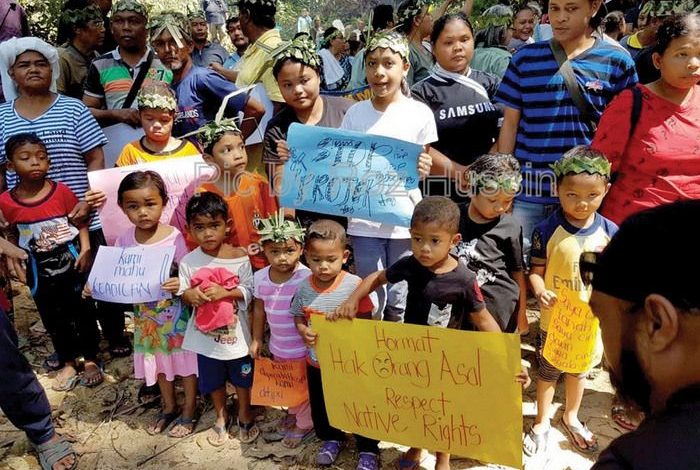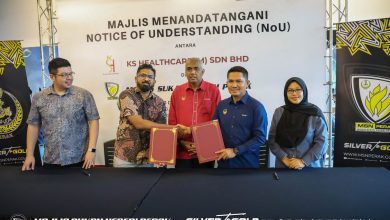400-hectares of Forest Reserve at Stake


By Chan Yuen-Li
About 60 Orang Asli from six villages in the Ulu Geruntum area namely Kampung Sungai Kapor, Kampung Sat, Kampung Ulu Kepayang, Kampung Empang Main, Kampung Poh and Kampung Ulu Geruntum came together recently with representatives from four NGOs to voice their objections against the destruction of the natural forest.
The Orang Asli communities have been involved in a legal battle to stop a mini hydroelectric project that encroaches upon their ancestral lands. “We oppose the hydro project because it has cleared 63 hectares of our land without our consent. We love our rivers, our forests and our ancestral burial grounds. My family’s graves have been bulldozed.”
“The government has said that we do not have any rights on this land because it is a forest reserve. We have given many letters to various government departments. And they tell us that they are investigating. But in the meantime, work has continued – bulldozing here and there,” said Uda Tiah a/l Bah Adim, one of the plaintiffs in the case.


Pic by David Loh.
The villagers held a humble ceremony to honour the graves of their ancestors which were allegedly destroyed by the mini-hydro project. “This ceremony is to explain the situation to the spirits of the departed who were disturbed by this project. We believe that their spirits also have a right to be at peace in the jungle where they were laid. When the project first started the villagers reported that there were disturbances. There has not been any ceremony before this to bring them peace,” said Mahat Anak Cina, one of the villagers.


The four NGOs attending the event – Green Earth Movement Society of Malaysia (GEMS), Sahabat Alam Malaysia (SAM), Persatuan Aktivis Sahabat Alam (KUASA) and Pertubuhan Alam Sekitar Sejahtera Malaysia (GRASS) – highlighted another imminent threat to this community. 400-hectare of permanent forest reserve in Kledang Saiong and Bukit Kinta where these villages are situated have been approved for conversion into monoculture “forest farms” or “ladang hutan”. In these farms, the natural forest will be clear-felled to plant timber latex clone (TLC). This project is part of a scheme to develop 56,503 hectares or more than 5.6% of the total Permanent Forest Reserve in the state of Perak into monoculture plantations with no change of the Permanent Forest Reserve (PRF) status.
According to SAM’s field researcher Meor Razak, “The policy on promoting the development of monoculture farms in the PRF area needs to be abolished. Generally, the justification and the main reason for the State Authority’s approval of a monoculture farm development project is because the PRF area has been identified as poor forests or degraded forests. A certain area of PRF in Malaysia becomes poor or degraded is not due to natural factors but due to human factors, especially illegal trespassing and exploration activities. Furthermore, poor forests can be improved through forestry rehabilitation techniques,” he added.


“We, the Orang Asli, do not understand the term “poor forests”. We do not consider these forests poor. We do not consider ourselves poor as the forest provides everything we need. We are rich in our way of life, rich in our culture and our beliefs. The people who are poor are the people who have created these shortsighted policies,” said Pesenang a/p Bah Singgong, one of the villagers.
The groups all voiced their concern at the loss of biodiversity, contamination of water catchment, massive carbon footprint and the human cost to the Orang Asli communities that these projects will create. They collectively called upon the state and federal governments to rethink the policy of developing monoculture plantations in permanent forest reserves when there are viable alternatives such as utilizing old tin mining land which Perak has in abundance.
Please support the villagers and NGOs by writing to: DATO’ SERI AHMAD FAIZAL BIN DATO’ AZUMU Menteri Besar Perak parlimentoftambun@gmail.com SANDREA NG SHY CHING State Assemblyman Teja adun.teja@gmail.com DATO’ NOLEE ASHILIN M. RADZI State Assemblyman Tualang Sekah nolee.radzi@gmail.com LEE BOON CHYE Member of Parliament Gopeng parlimen.gopeng@gmail.com

